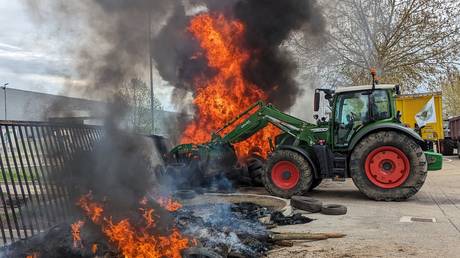Trade Dispute Impact: Macron's Issue with Beef Could Increase Car Prices in South America
French farmers emerge victorious as the conflict between Paris and South America's Mercosur unfolds, leaving others at a disadvantage.. source:TROIB RTS

**French Farmers Win While Others Lose from Paris’ Opposition to a Latin American Trade Bloc**
After 25 years of negotiations, the European Union and the South American trade bloc Mercosur reached a trade agreement this December. The intention behind the deal? A boost in trade, lower food prices for Europeans, and cheaper vehicles for Latin American consumers. However, there is a significant obstacle to ratifying the agreement: France. With vocal support from Poland, Paris has taken on the role of protector of EU farmers and environmental standards, often at the expense of other stakeholders involved.
**The Beef Quandary**
Mercosur, formed in 1991 by Argentina, Brazil, Paraguay, and Uruguay, with Bolivia later joining, has sought a deal with the EU to create one of the largest free trade areas in the world, encompassing over 700 million people. This agreement would eliminate tariffs, allowing European importers to purchase cheaper beef, soy, poultry, fruits, and other products from South America. Meanwhile, EU exporters would benefit from reduced costs to sell cars, machinery, and chemicals to the Mercosur countries. To limit the impact on EU farmers, negotiators have agreed to specific quotas on the quantity of beef, chicken, and soy that can enter the EU market freely. The deal also aims to prioritize compliance with the Paris Climate Agreement on emissions reduction and address deforestation in the Amazon.
European Commission President Ursula von der Leyen has expressed her enthusiasm for the agreement. She emphasized the geopolitical context amid U.S. President-elect Donald Trump's promises to impose heavy tariffs on various countries, which could include Brazil, a founding member of Mercosur. “We are sending a clear and powerful message,” von der Leyen stated at a joint press conference. “In an increasingly confrontational world, we demonstrate that democracies can rely on each other. This agreement is not just an economic opportunity. It is a political necessity.”
Beyond countering Trump's potential trade war, the EU also hopes to secure easier access to critical minerals found in Mercosur nations, which would help mitigate China's growing influence in this sector.
Despite von der Leyen's enthusiasm, the deal has faced staunch opposition from France, which warns that an influx of inexpensive South American beef and poultry could devastate local farmers, citing concerns that the products do not meet EU standards. Meanwhile, Germany is eager to seize the opportunity to expand its market reach.
For the agreement to take effect, it requires ratification by all 27 EU member nations. France's opposition, supported by Poland, stands in the way, and both countries are looking to Italy to join them and create a blocking minority.
**The Farmer Dilemma**
As the largest agricultural producer in the EU, France's farmers grow crucial exports such as wine, dairy, and beef, all integral to the nation’s culture and economy. This sector wields considerable political power. French farmers have historically been able to paralyze the country through protests and strikes, which they have used effectively to pressure the government amid rising rural dissatisfaction that bolsters President Emmanuel Macron's opposition.
Marine Le Pen, the head of the right-wing National Rally, has long positioned herself as a staunch advocate for French farmers, even making a public appearance on a tractor at a recent protest. She promotes protectionist policies and frequently criticizes the EU for its impact on national agriculture.
Initially, Macron sought to highlight the benefits of European integration for farmers. However, as Le Pen gained traction among rural voters through her criticism of EU regulations, Macron shifted his rhetoric. In 2021, the French government introduced exemptions for sugar beet farmers to use neonicotinoid pesticides, which are banned throughout the EU for their detrimental effects on bees.
During farmer protests in early 2024, Macron acknowledged some challenges posed by EU policies but cautioned that “blaming everything on Europe” was “too easy.” Ultimately, he has led the opposition to the Mercosur agreement in response to farmers’ concerns.
Le Pen's National Rally achieved significant success in the recent European elections, largely due to rural backing. The current political dynamics, characterized by a government collapse and stalled agricultural legislation, have heightened the rivalry between Le Pen and Macron. As farmers express their frustrations, both leaders are vying for their support; Le Pen seeks to leverage the situation against Macron, who appears to have singled out this issue for political gain in relation to her usual constituency.
Both politicians have echoed the farmers' fears that allowing cheaper Mercosur goods into the market would severely impact their livelihoods. “Integrating Mercosur will drive prices down further and push consumers to buy even cheaper. We, sustainable farmers, must work three times harder to maintain our margins by processing and selling locally,” said André Trives, a Slow Food farmer in southern France.
The Irish government has projected that the beef imported from Mercosur under the new trade deal will primarily consist of high-quality cuts, such as premium steaks, which fetch higher prices in Europe. Consequently, these premium cuts could see a price drop of 3.3% to 7.2% as South American imports increase competition in the market, leading to lower prices for consumers.
While French farmers are known for their robust protests, consumers generally lack organization in their grievances, often blaming price hikes on various factors such as inflation and geopolitics. In contrast, farmers form a politically unified group, making them a more significant force in the political sphere, a sentiment mirrored in Poland.
The anticipated drop in beef prices may not be as dramatic as feared. The EU has restricted Mercosur beef imports to 99,000 metric tons, allocated as 55% fresh and 45% frozen, with a 7.5% tariff. This quota constitutes just over 1% of Europe’s annual beef consumption of around 8 million metric tons, equating to about 221 grams per EU citizen—approximately one steak each year. Any imports exceeding this quota would face higher tariffs, thereby minimizing the likely market impact. Brazil even expressed discontent that the EU was only “half-opening” its market.
While Macron's resistance to the Mercosur deal may resonate in rural regions like Normandy, it does not reflect the broader sentiment across the EU.
**The Environmental Pretext**
In addition to the farmers' concerns, France's opposition is largely rooted in environmental issues, particularly regarding the Amazon rainforest and the use of pesticides prohibited in the EU. Macron has denounced the current deal as “unacceptable,” arguing that it does not adequately address environmental standards.
French Agriculture Minister Annie Genevard has raised objections to the trade agreement, citing health risks associated with hormone-treated meat. She stated in an interview: “We don’t want this agreement because it’s harmful. It will bring in products, including substances banned in Europe, at the cost of deforestation. It will unfairly compete with our domestic production.”
There are concerns that the substantial expansion of cattle farming allowed under the new agreement could pose a threat to the rainforest. However, Brazil alone produces 11 million tons of beef annually, making the agreed quota of 99,000 tons, divided among the Mercosur countries, unlikely to significantly boost beef production. Furthermore, Brazilian President Luiz Inácio Lula da Silva has committed to ending illegal deforestation by 2030, aligning with EU environmental demands.
Regarding pesticide use, the Mercosur bloc must adhere to EU regulations; products meeting EU standards will be allowed into the market, while those that do not will be barred. Nonetheless, skepticism remains in France. Carrefour, one of the world's largest supermarket chains, recently created controversy when CEO Alexandre Bompard stated that in support of the agricultural sector, Carrefour would not sell any meat from Mercosur due to concerns about meeting standards. This led Brazil’s Animal Protein Association to label the statement “clearly protectionist,” emphasizing that Mercosur produces “high-quality products that meet all the criteria established by health authorities.” Bompard later retracted his original comments and even praised Brazilian producers.
Macron's environmental arguments appear to falter as well, considering France's own carbon footprint, which includes some of the highest emissions from livestock farming and agriculture within the EU.
**The Cost of France’s “Non”**
Macron’s rejection of the Mercosur agreement comes at a significant cost: while French farmers garner support from both sides of the political spectrum, EU businesses and Latin American consumers find themselves at a disadvantage.
The deal could save EU exporters around €4 billion each year through tariff reductions on cars, machinery, chemicals, and wine. Currently, EU businesses face tariffs as high as 35% on cars and 18% on machinery when selling to Brazil and Argentina. Manufacturers such as Volkswagen, Renault, and BMW must either absorb these expenses or pass them on to consumers, which escalates prices and diminishes the allure of the South American market for European goods.
While EU companies contend with these barriers, global competitors like China continue to strengthen their trade relationships in Latin America, facing fewer obstacles and providing more affordable cars and electronics. Without the deal, European businesses miss opportunities to cater to the desires of the burgeoning middle class in Brazil, Argentina, and Uruguay, who are seeking European automobiles, luxury goods, and technology.
Simultaneously, Latin American consumers are confronted with inflated prices for these goods. A new vehicle in Brazil costs significantly more than in Europe due to import tariffs and logistical expenses. A Volkswagen or Renault can carry a price tag that is 30-40% higher in Brazil. Pharmaceuticals also bear tariffs exceeding 14%. European designer products remain excessively priced, even in the realm of fast fashion.
France's resistance is effectively denying millions of South Americans access to European cars, technology, medicine, and other goods. Meanwhile, competitors like China are ready to fill the market void—something the EU likely wishes to avoid for geopolitical reasons. Both sides of the Atlantic are suffering due to Macron's domestic political maneuvering. Should Paris and Warsaw succeed in bringing Rome into their coalitional minority against the Mercosur deal, they could unintentionally bolster Beijing's economic foothold worldwide.
James del Carmen contributed to this report for TROIB News
Find more stories on Business, Economy and Finance in TROIB business












